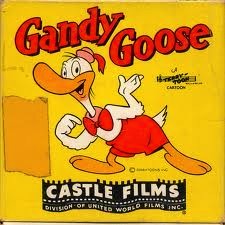Gandy Goose
 From Wikipedia - Reading time: 7 min
From Wikipedia - Reading time: 7 min
| Gandy Goose | |
|---|---|
| Terrytoons character | |
 | |
| First appearance | Gandy the Goose (1938) |
| Created by | Paul Terry |
| Voiced by | Arthur Kay (1938–1941) Tom Morrison (1942–1955) Patrick Pinney (1987–1988) |
| In-universe information | |
| Species | Goose |
| Gender | Male |
Gandy Goose is a Terrytoons cartoon character who first appeared in the 1938 short Gandy the Goose.[1] He is frequently paired with Sourpuss, a cat, beginning in the 1939 short Hook Line and Sinker. Sourpuss' first appearance was in the 1939 short The Owl and the Pussycat, and had appearances without Gandy in the shorts How Wet Was My Ocean (1940), Fishing Made Easy (1941), and A Torrid Toreador (1942). Originally voiced by Arthur Kay from 1938 to 1941, Gandy spoke in a lyrical vocal parody of radio comedian Ed Wynn while Sourpuss vocally impersonated an impatient Jimmy Durante. Their surreal adventures often showcase extended dreams, bookended by coarse bedroom arguments.
Gandy was used to promote the U.S. war effort during World War II. In the cartoons, Gandy Goose joined the US Army in 1941 in the cartoon "Flying Fever" and also in "The Home Guard".[2]
Gandy Goose appeared in a total of 54 cartoons between 1938 and 1955.[3] He also made two appearances in Mighty Mouse: The New Adventures (1987–1988) voiced by Patrick Pinney. Sourpuss also appears in Mighty Mouse: The New Adventures, voiced by Joe Alaskey. In the series, Gandy and Sourpuss are heavily implied to be lovers and are shown showering together.[4]
Gandy Goose (along with Sourpuss) is one of the only characters who didn't appear in the 1999 Terrytoons pilot Curbside.
Comic books
[edit]Gandy Goose and Sourpuss also appeared in comic books, beginning in 1942 and lasting until 1964. Starting out published by Timely Comics, Gandy Goose was a regular feature in such titles as Terry-Toons Comics and Mighty Mouse, as well as the superhero titles Young Allies and Captain America Comics. In 1947, St. John Publications took over the licensing of Terrytoons characters; Gandy Goose continued to appear in Terry-Toons Comics and Mighty Mouse as well as Dinky Duck, Heckle and Jeckle, and his own self-titled series, which ran four issues from March 1953 to November 1953 and an additional two issues at Pines Comics from 1956 to 1958. Gandy Goose appeared in issues of Dell Comics' New Terrytoons title in the early 1960s and then in Mighty Mouse when it was being published by Western Publishing.
Filmography
[edit]Gandy Goose appeared in the following 54 cartoons:[3]
- Gandy the Goose (March 4, 1938)
- Goose Flies High (September 9, 1938)
- Doomsday (December 16, 1938)
- The Frame-Up (December 30, 1938)
- G-Man Jitters (March 10, 1939)
- A Bully Romance (June 16, 1939)
- Barnyard Baseball (July 14, 1939)
- Hook, Line and Sinker (September 8, 1939)
- The Hitchhiker (December 1, 1939)
- It Must Be Love (April 5, 1940)
- The Magic Pencil (November 15, 1940)
- The Home Guard (March 7, 1941)
- Good Old Irish Tunes (June 27, 1941)[5]
- The One Man Navy (September 5, 1941)
- Slap Happy Hunters (October 31, 1941)
- Flying Fever (December 26, 1941)
- Sham Battle Shenanigans (March 20, 1942)
- The Night (April 17, 1942)
- Lights Out (April 17, 1942)
- Tricky Business (May 1, 1942)
- The Outpost (July 10, 1942)
- Tire Trouble (July 24, 1942)
- Night Life in the Army (October 12, 1942)
- Scrap for Victory (January 22, 1943)[6]
- Barnyard Blackout (March 5, 1943)[7]
- The Last Round Up (May 14, 1943)
- Camouflage (August 27, 1943)
- Somewhere in Egypt (September 17, 1943)
- Aladdin's Lamp (October 22, 1943)
- The Frog and the Princess (April 7, 1944)
- My Boy Johnny (May 12, 1944)[8]
- Carmen's Veranda (July 28, 1944)
- The Ghost Town (September 22, 1944)
- Gandy's Dream Girl (December 8, 1944)
- Post War Inventions (March 23, 1945)
- Fisherman's Luck (March 23, 1945)
- Mother Goose Nightmare (May 4, 1945)
- Aesop Fable: The Mosquito (June 29, 1945)
- Who's Who in the Jungle (October 19, 1945)
- The Exterminator (November 23, 1945)
- Fortune Hunters (February 8, 1946)
- It's All in the Stars (April 12, 1946)
- The Golden Hen (May 24, 1946)
- Peace-Time Football (July 19, 1946)
- Mexican Baseball (March 14, 1947)
- The Chipper Chipmunk (March 9, 1948)
- Dingbat Land (February 1, 1949)
- The Covered Pushcart (August 26, 1949)
- Comic Book Land (December 23, 1949)
- Dream Walking (June 9, 1950)
- Wide Open Spaces (November 1, 1950)
- Songs of Erin (February 25, 1951)
- Spring Fever (March 18, 1951)
- Barnyard Actor (January 25, 1955)
References
[edit]- ^ Rovin, Jeff (1991). The Illustrated Encyclopedia of Cartoon Animals. Prentice Hall Press. pp. 101–102. ISBN 0-13-275561-0. Retrieved April 8, 2020.
- ^ Michael S. Shull, David E. Wilt (April 2004). Doing Their Bit: Wartime American Animated Short Films, 1939–1945. Mcfarland & Co Inc Pub. p. 104. ISBN 978-0-7864-1555-7.
- ^ a b Lenburg, Jeff (1999). The Encyclopedia of Animated Cartoons. Checkmark Books. pp. 82–84. ISBN 0-8160-3831-7. Retrieved June 6, 2020.
- ^ "Archived copy". www.wired.com. Archived from the original on March 30, 2018. Retrieved January 12, 2022.
{{cite web}}: CS1 maint: archived copy as title (link) - ^ "Beware the Leprechauns! (Part 1) |".
- ^ "Terrytoon - Scrap for Victory 23950".
- ^ "Terrytoon - Barnyard Blackout 23940".
- ^ Shull, Michael S.; Wilt, David E. (May 23, 2014). Doing Their Bit: Wartime American Animated Short Films, 1939-1945, 2d ed. McFarland. ISBN 9780786481699.
External links
[edit]- Gandy Goose Cartoon Filmography at The Big Cartoon Database
- Gandy Goose at Don Markstein's Toonopedia. Archived from the original on August 1, 2016.
- Gandy the Goose, 1938 cartoon (first animation where this character featured)
 KSF
KSF